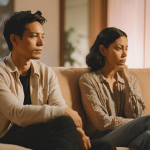Deciding whether to stay in a marriage for the sake of the children is one of the hardest choices a parent can face. Many parents worry that separating will harm their kids, while others fear that staying in an unhappy or toxic relationship might hurt them even more. It’s a tough situation with no simple answers.
In this post, we’ll explore both sides of the argument to help you make an informed and thoughtful decision. Remember, no two families are the same, so what works for one may not work for another.
If you’re thinking about separation, check out our post on Key Questions to Ask Before Ending Your Marriage for more guidance.
The Argument for Staying in the Marriage
For many parents, the idea of keeping the family together feels like the most stable and loving option for their children. Here’s why some choose to stay:
1. Stability and Routine
Children thrive on stability. A united household can provide them with a predictable environment where routines, school, and relationships remain unchanged. Disruptions, such as moving homes or adjusting to shared custody, can be difficult for kids to handle.
2. Role Models for Relationships
Parents often feel that by staying together, they can model teamwork and commitment. Even if the marriage isn’t perfect, they may believe that maintaining the family unit teaches children the importance of perseverance.
3. Avoiding the Emotional Impact of Divorce
Divorce is a significant life change that can be hard on children. Many parents worry that the emotional toll of separation—such as feelings of abandonment or divided loyalties—will be too much for their kids.
For tips on helping children cope during a divorce, read our guide on Talking to Your Children About Emotional Harm.
The Case for Leaving the Marriage
While staying together may seem like the best option on the surface, remaining in a strained or toxic relationship can also affect children in harmful ways. Here’s why some parents decide to leave:
1. Children Sense Unhappiness
Kids are incredibly intuitive. If they see constant arguments, tension, or unhappiness between parents, it can create an emotionally stressful environment. Over time, this may affect their mental health and how they view relationships.
2. Avoiding Toxic Dynamics
In marriages with verbal abuse, manipulation, or neglect, staying together can expose children to harmful behaviors. Kids might internalize these unhealthy patterns, impacting their self-esteem and future relationships.
3. The Importance of Parental Well-Being
A happy, emotionally healthy parent is better equipped to care for their children. If staying in the marriage is damaging your mental health, leaving might allow you to create a more positive and nurturing environment for your kids.
For more on protecting your children emotionally, see our post on Recognizing Emotional Harm to Children During Divorce.
Weighing the Pros and Cons
Here are some key factors to consider when deciding whether staying or leaving is best for your family:
1. The Quality of the Relationship
- Are disagreements rare and manageable, or are they constant and damaging?
- Is there mutual respect, even if the emotional connection has faded?
2. The Emotional Environment
- Do your children seem happy, secure, and well-adjusted?
- Or are they showing signs of stress, such as acting out, withdrawing, or struggling in school?
3. Your Personal Well-Being
- Are you emotionally and mentally healthy enough to stay and provide a positive environment?
- Would leaving allow you to be a better parent and role model?
4. The Level of Support Available
- Do you have family, friends, or community resources to help you through a separation or to strengthen your marriage?
What Research Says
Studies show mixed outcomes for children of divorce. While some kids struggle with the transition, many adjust well over time, especially when both parents remain involved and supportive. Research also highlights that staying in a high-conflict or toxic marriage can harm children more than a peaceful separation.
If you’re considering separation, check out our post on Navigating Property Division in Divorce for insights into managing shared assets.
Practical Steps to Make the Best Decision
- Seek Counseling Couples therapy or individual counseling can help you understand your options and work through emotions. Therapy can also provide tools to improve communication and manage conflict.
- Focus on Co-Parenting Whether you stay together or separate, prioritizing your children’s needs is essential. Work with your spouse to create a supportive environment.
- Evaluate Financial Stability If you’re worried about the financial impact of divorce, explore resources like our guide on The Financial Implications of Staying vs. Divorcing.
- Talk to Your Kids If you decide to separate, be honest with your children in an age-appropriate way. Reassure them that they are loved and that both parents will continue to support them.
Final Thoughts
There’s no one-size-fits-all answer to whether staying in a marriage for the kids is worth it. The decision depends on the unique dynamics of your relationship, your children’s needs, and your well-being as a parent. What matters most is providing a safe, loving, and stable environment for your children—whether that’s within the marriage or after separation.
Take time to reflect, seek support, and make a choice that feels right for your family. Remember, you’re not alone in this journey.
For more insights on navigating tough marriage decisions, visit our blog on 5 Signs It’s Time to Leave Your Marriage.


